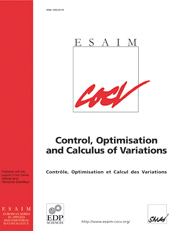Crossref Citations
This article has been cited by the following publications. This list is generated based on data provided by
Crossref.
Li, Chong
Ng, K. F.
and
Pong, T. K.
2008.
Constraint Qualifications for Convex Inequality Systems with Applications in Constrained Optimization.
SIAM Journal on Optimization,
Vol. 19,
Issue. 1,
p.
163.
Boţ, Radu Ioan
Grad, Sorin-Mihai
and
Wanka, Gert
2008.
On strong and total Lagrange duality for convex optimization problems.
Journal of Mathematical Analysis and Applications,
Vol. 337,
Issue. 2,
p.
1315.
Chuong, Thai Doan
and
Yao, Jen-Chih
2009.
CODERIVATIVES OF EFFICIENT POINT MULTIFUNCTIONS IN PARAMETRIC
VECTOR OPTIMIZATION.
Taiwanese Journal of Mathematics,
Vol. 13,
Issue. 6A,
Chuong, Thai Doan
Huy, Nguyen Quang
and
Yao, Jen-Chih
2010.
Subdifferentials of Marginal Functions in Semi-infinite Programming.
SIAM Journal on Optimization,
Vol. 20,
Issue. 3,
p.
1462.
Goberna, M.A.
2010.
Optimization and Optimal Control.
Vol. 39,
Issue. ,
p.
23.
Kim, DoSang
and
Son, TaQuang
2010.
"Equation missing" -Optimal Solutions in Nonconvex Semi-Infinite Programs with Support Functions.
Fixed Point Theory and Applications,
Vol. 2011,
Issue. 1,
Dinh, N.
Nghia, T.T.A.
and
Vallet, G.
2010.
A closedness condition and its applications to DC programs with convex constraints.
Optimization,
Vol. 59,
Issue. 4,
p.
541.
Cánovas, M. J.
López, M. A.
Mordukhovich, B. S.
and
Parra, J.
2010.
Variational Analysis in Semi-Infinite and Infinite Programming, II: Necessary Optimality Conditions.
SIAM Journal on Optimization,
Vol. 20,
Issue. 6,
p.
2788.
Fang, D.H.
Li, C.
and
Ng, K.F.
2010.
Constraint qualifications for optimality conditions and total Lagrange dualities in convex infinite programming.
Nonlinear Analysis: Theory, Methods & Applications,
Vol. 73,
Issue. 5,
p.
1143.
Dinh, N.
Goberna, M. A.
and
López, M. A.
2010.
On the Stability of the Feasible Set in Optimization Problems.
SIAM Journal on Optimization,
Vol. 20,
Issue. 5,
p.
2254.
Fang, D. H.
Li, C.
and
Ng, K. F.
2010.
Constraint Qualifications for Extended Farkas's Lemmas and Lagrangian Dualities in Convex Infinite Programming.
SIAM Journal on Optimization,
Vol. 20,
Issue. 3,
p.
1311.
Kanzi, N.
and
Nobakhtian, S.
2010.
Optimality conditions for non-smooth semi-infinite programming.
Optimization,
Vol. 59,
Issue. 5,
p.
717.
Kanzi, Nader
2011.
Necessary optimality conditions for nonsmooth semi-infinite programming problems.
Journal of Global Optimization,
Vol. 49,
Issue. 4,
p.
713.
Li, Chong
and
Ng, K. F.
2011.
Subdifferential Calculus Rules for Supremum Functions in Convex Analysis.
SIAM Journal on Optimization,
Vol. 21,
Issue. 3,
p.
782.
2011.
Optimality Conditions in Convex Optimization.
p.
333.
Jeyakumar, V.
and
Li, G.
2011.
Robust Farkas’ lemma for uncertain linear systems with applications.
Positivity,
Vol. 15,
Issue. 2,
p.
331.
Huy, N. Q.
and
Yao, J.-C.
2011.
Semi-Infinite Optimization under Convex Function Perturbations: Lipschitz Stability.
Journal of Optimization Theory and Applications,
Vol. 148,
Issue. 2,
p.
237.
Chuong, Thai Doan
2011.
Clarke coderivatives of efficient point multifunctions in parametric vector optimization.
Nonlinear Analysis: Theory, Methods & Applications,
Vol. 74,
Issue. 1,
p.
273.
Son, T. Q.
Kim, D. S.
and
Tam, N. N.
2012.
Weak stability and strong duality of a class of nonconvex infinite programs via augmented Lagrangian.
Journal of Global Optimization,
Vol. 53,
Issue. 2,
p.
165.
Kruger, Alexander Y.
and
López, Marco A.
2012.
Stationarity and Regularity of Infinite Collections of Sets. Applications to Infinitely Constrained Optimization.
Journal of Optimization Theory and Applications,
Vol. 155,
Issue. 2,
p.
390.




